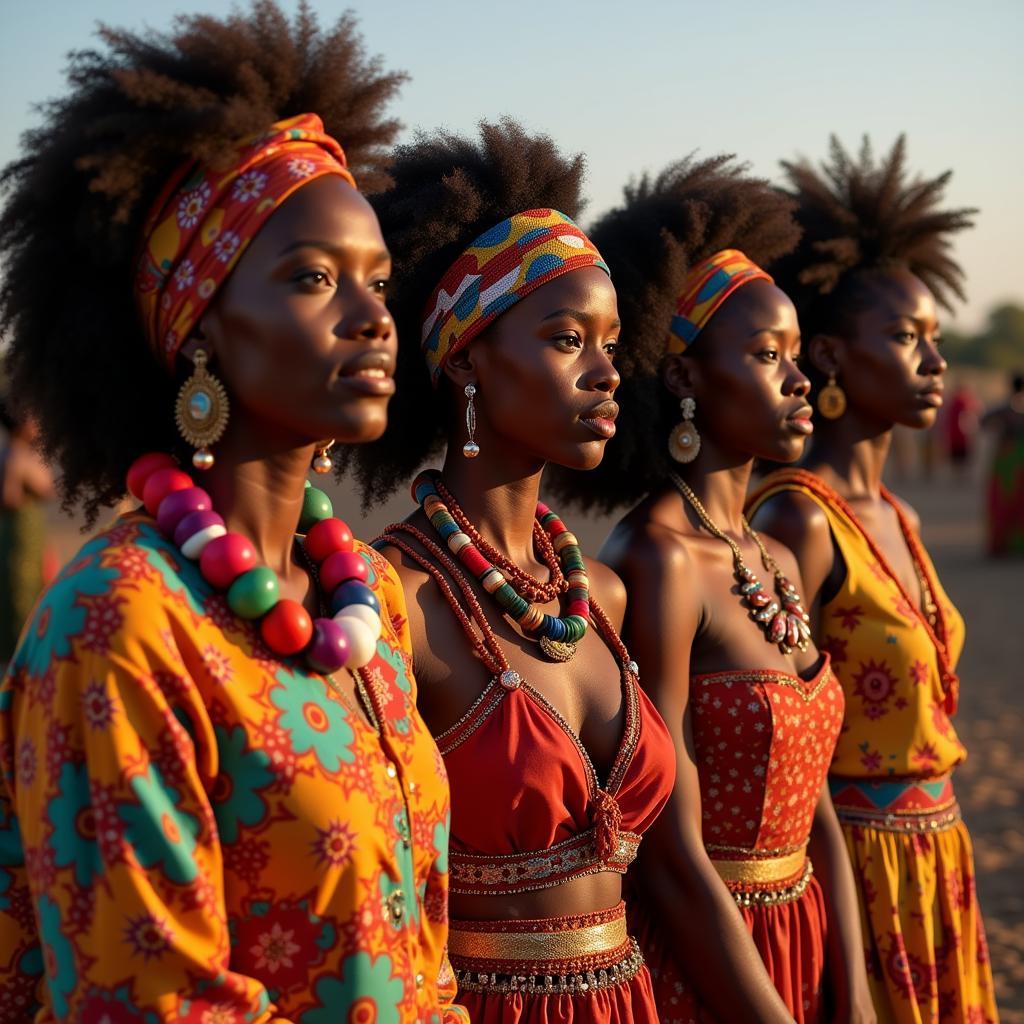Exploring the Rich Tapestry of African Ethnicity
African Ethnicity is a complex and fascinating subject, encompassing a vast array of cultures, languages, and traditions across the continent. Understanding this diversity is key to appreciating the richness of African history and the vibrant tapestry of its people. From the bustling marketplaces of Marrakech to the serene landscapes of the Serengeti, African ethnicity shapes every aspect of life, influencing social structures, artistic expression, and spiritual beliefs. This article delves into the multifaceted nature of African ethnicity, exploring its historical roots, contemporary expressions, and the challenges and opportunities it presents in a globalized world.
The concept of “African ethnicity” itself can be challenging to define, as it encompasses thousands of distinct groups, each with its own unique identity. These identities are often fluid and overlapping, shaped by factors such as geography, language, religion, and historical experience. Rather than viewing African ethnicity as a monolithic entity, it’s crucial to recognize the incredible diversity within the continent. This diversity is a testament to the resilience and creativity of African peoples, who have adapted to a wide range of environments and historical circumstances. For instance, the nomadic traditions of the Maasai in East Africa contrast sharply with the urban cultures of Lagos or Nairobi, yet both are integral parts of the African experience.
The Historical Roots of African Ethnicity
The origins of African ethnicity are deeply intertwined with the continent’s long and complex history. From the ancient kingdoms of Egypt and Kush to the trans-Saharan trade routes that connected Africa to the wider world, historical events have played a crucial role in shaping ethnic identities. The Bantu migrations, for example, which began thousands of years ago, led to the spread of Bantu languages and cultures across much of sub-Saharan Africa. Similarly, the arrival of Islam and Christianity in later centuries had a profound impact on religious and cultural practices, further contributing to the diversity of African ethnicity. Understanding this historical context is essential for appreciating the nuances of contemporary African societies.
Language and Culture: Defining Features of African Ethnicity
Language is often a key marker of ethnic identity in Africa, with over 2,000 languages spoken across the continent. These languages are not merely tools of communication; they are also repositories of cultural knowledge, traditions, and worldviews. Oral traditions, including storytelling, poetry, and proverbs, play a vital role in transmitting cultural values and historical memory from one generation to the next. For example, the griots of West Africa are renowned for their ability to preserve and transmit historical narratives through oral performance. These rich linguistic and cultural traditions are essential components of African ethnicity.
African Ethnicity in a Globalized World
In today’s interconnected world, African ethnicity faces both challenges and opportunities. Globalization has led to increased cultural exchange and interconnectedness, but it has also raised concerns about the preservation of cultural heritage in the face of homogenizing forces. Many African countries are grappling with the complexities of maintaining their unique cultural identities while engaging with the global community.
How has globalization impacted African identity? It has created new avenues for cultural expression and exchange, allowing African artists, musicians, and writers to reach global audiences. At the same time, it has also led to challenges such as cultural appropriation and the commodification of cultural traditions. Navigating these complexities is a crucial task for African societies as they strive to preserve their rich cultural heritage while embracing the opportunities of a globalized world.
The Role of Technology in Preserving African Ethnicity
Technology is playing an increasingly important role in preserving and promoting African ethnicity. From online platforms that showcase African languages and cultures to digital archives that document traditional arts and crafts, technology offers new tools for cultural preservation and dissemination.
“Technology offers a powerful tool for preserving and celebrating the rich diversity of African ethnicity,” says Dr. Abeni Adebayo, a renowned anthropologist specializing in African cultures. “It allows us to connect with our heritage in new and innovative ways, while also sharing it with the world.”
Addressing Misconceptions about African Ethnicity
One of the key challenges in understanding African ethnicity is overcoming the pervasive misconceptions and stereotypes that often surround the continent. The media often portrays Africa as a monolithic entity, overlooking the incredible diversity of its people and cultures. It’s essential to challenge these simplistic narratives and promote a more nuanced understanding of African ethnicity.
“It’s crucial to move beyond stereotypical representations of Africa and recognize the continent’s rich tapestry of cultures and traditions,” explains Professor Kwame Nkrumah, a leading historian of African art. “Each ethnic group has its own unique story to tell, and it’s important to listen to these diverse voices.”
african american dentist near me
Conclusion
African ethnicity is a vibrant and dynamic force that shapes the lives of millions of people across the continent. Understanding this rich tapestry of cultures, languages, and traditions is essential for appreciating the complexity and beauty of Africa. By embracing its diversity and challenging stereotypes, we can gain a deeper understanding of the continent’s past, present, and future. African ethnicity is not a static concept; it is a living, breathing entity that continues to evolve and adapt in a changing world.
FAQ
- What are the major ethnic groups in Africa? There are thousands of distinct ethnic groups in Africa, including the Yoruba, Igbo, Zulu, Xhosa, and Maasai, among many others.
- How is African ethnicity different from race? Ethnicity refers to shared cultural characteristics, while race is a social construct based on physical traits.
- What is the role of religion in African ethnicity? Religion plays a significant role in many African cultures, influencing social customs, beliefs, and practices.
- How does language contribute to African ethnicity? Language is often a key marker of ethnic identity, reflecting cultural values and historical experiences.
- What are the challenges facing African ethnicity today? Challenges include globalization, cultural appropriation, and the preservation of cultural heritage.
- How can we promote a better understanding of African ethnicity? Education, cultural exchange, and challenging stereotypes are essential.
- What is the significance of African ethnicity in a globalized world? It represents a rich source of cultural diversity and offers valuable perspectives on global issues.
Need support? Contact us 24/7: Phone: +255768904061, Email: [email protected] or visit us at Mbarali DC Mawindi, Kangaga, Tanzania.



